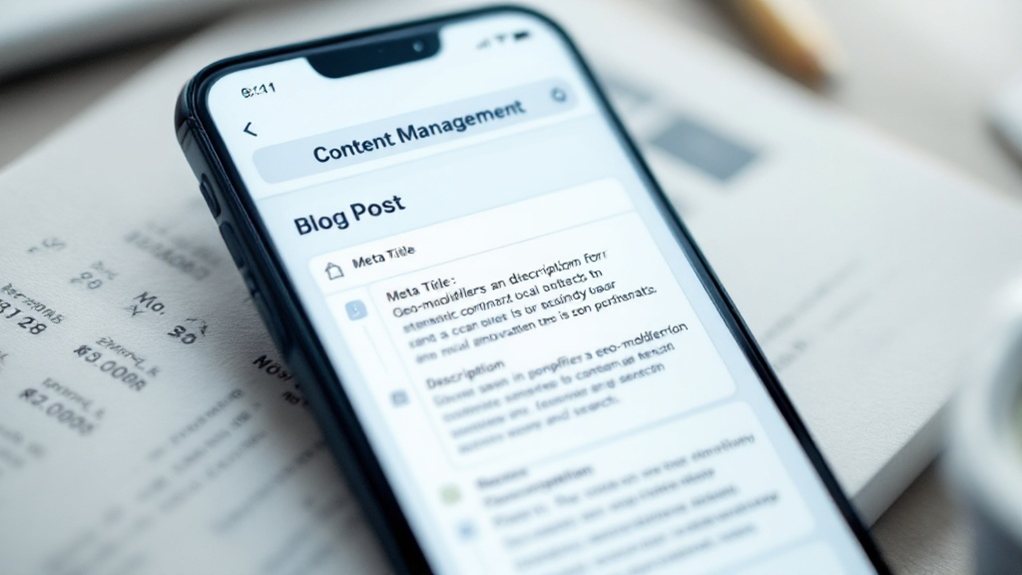Optimizing your blog's meta titles and descriptions is crucial for boosting local search visibility. Craft compelling, geo-targeted meta tags that align with your target audience's search intent. Leverage tools like Google Keyword Planner and SEMrush to uncover relevant local keywords. Incorporate geo-modifiers in your meta titles, and ensure your meta descriptions summarize content and showcase your local expertise. Monitoring your local SEO performance and adapting your meta tags to seasonal and event-based searches can further improve your visibility. There's more to discover about refining your local meta tag optimization.
Understanding the Importance of Meta Titles and Descriptions for Local Search

As a local business owner, you can't afford to overlook the significance of meta titles and descriptions in your online presence. These HTML elements play a crucial role in how your website appears in search engine results, directly impacting your local visibility and user engagement. Meta titles and descriptions are key components of local search engine optimization (SEO). Meta titles act as clickable headlines, while meta descriptions provide a concise summary of your page's content. By optimizing these elements with relevant local keywords, you can improve your search rankings, increase click-through rates, and ultimately drive more qualified leads to your business. Investing time in crafting compelling, informative meta titles and descriptions will give you a distinct advantage in the local search landscape.
Conducting Targeted Keyword Research for Local SEO

Proper keyword research is crucial for local SEO success. Targeting local keywords can increase visibility and attract more organic traffic. Leverage tools like Google Keyword Planner and SEMrush to uncover geo-modifier keywords that align with your target audience's search intent. Prioritize high-relevance, low-competition keywords to drive quality traffic to your website.
Leveraging Local Keyword Tools
Conducting targeted keyword research is the cornerstone of any local SEO strategy. Leverage powerful tools like SEMrush's Keyword Magic Tool, Google Keyword Planner, and Ahrefs to uncover valuable local keyword insights. These platforms provide granular data on search volume, keyword difficulty, and localized competitiveness to guide your content optimization efforts.
| Tool | Strength |
|---|---|
| SEMrush | Detailed keyword data and variations |
| Google Keyword Planner | Free tool to search keywords by location |
| Ahrefs | Comprehensive competitor keyword and backlink analysis |
Pairing these advanced tools with your own location-based brainstorming can help you identify the most relevant and attainable keywords to boost your local visibility. Local keyword research is an integral component of any successful local SEO strategy for small businesses.
Identifying Geo-Modifier Keywords
When it comes to local SEO, identifying geo-modifier keywords is crucial for boosting your online visibility. Geo-modifiers are location-specific terms that express a search query's local intent, connecting your content to a particular geographic area. By incorporating these keywords naturally into your blog titles, meta descriptions, URLs, and image optimization, you can signal local relevance to search engines and users. Developing a geographical SEO strategy is necessary if a company provides local services but does not include them on its website. Leverage keyword research tools, competitor analysis, and local trends to uncover high-performing geo-modifiers. Remember to avoid overuse and ensure your geo-modifiers align with your business focus. Continuously monitor and adjust your keyword strategy based on performance data to maintain a strong local search presence.
Aligning With Local Search Intent
Crafting a targeted local keyword strategy begins with understanding your audience's search intent. By incorporating keywords that align with their needs and preferences, you can better cater to their local search queries and increase your visibility in the SERPs. Consider the following approaches:
- Question-Based Keywords: Leverage keywords that answer common questions, like “best bakeries near me” or “library hours in [City].”
- Dietary Preferences: Incorporate keywords that reflect dietary restrictions or preferences, such as “gluten-free restaurants [City]” or “vegan cafes [City].”
- Price Point Considerations: Include keywords that target budget-conscious customers, like “affordable [Service] [City]” or “cheap [Product] [City].”
- Convenience-Oriented Keywords: Focus on keywords that emphasize delivery, pickup, or same-day services to appeal to convenience-driven searches.
- Event-Related Keywords: Leverage keywords related to local events or festivals to capitalize on seasonal interest in your area.
Nearly 88% of people who search for a local business on their phone take action within 24 hours, which highlights the importance of aligning your content with local search intent.
Crafting Compelling Meta Titles With Geo-Modifiers

When crafting meta titles, don't forget to incorporate localized keywords. Proper placement of GeoMods in titles can significantly impact local SEO. Additionally, optimizing for voice search can give your local business an edge. These tactics, combined with compelling geo-modifiers, can elevate your online presence and attract more relevant traffic.
Localized Keyword Placement
Optimizing your blog post's meta titles with localized keyword placement is a crucial step in boosting your local search visibility. Include your primary keywords close to the beginning of the title tag to ensure visibility in search results. Incorporate geo-modifiers, such as city names, to signal local relevance. Remember, title tags help search engines understand your page's content and influence click-through rates, so use relevant keyword modifiers to enhance their appeal. Keep your titles concise, under 60 characters, to avoid being cut off in search engine results pages.
The position of the keyword in the title tag doesn't really matter according to the test results. Place geo-modifiers in both titles and content for better SEO impact. Test different title variations featuring geo-modifiers to find the most effective one. Leverage geo-modifiers in meta descriptions to reinforce local relevance. Conduct thorough keyword research to identify relevant local keywords and geo-modifiers. Implement structured data like LocalBusiness schema to improve local SEO impact.
Optimizing for Voice Search
Frequently, optimizing your meta titles for voice search involves crafting compelling content that incorporates geo-modifiers. Use phrases like “Best [service] in [city]” to focus on local search. Format meta titles as questions that reflect common voice queries, and include relevant local keywords naturally. Write engaging descriptions that answer questions directly and encourage clicks. Maintain consistent branding and messaging across all local pages. Leverage long-tail keywords to target niche audiences with lower competition. Target niche audiences with lower competition using specific, long-tail keywords that mimic conversational phrasing. Implement schema markup and regularly audit local content to ensure it aligns with voice search trends. Prioritize mobile-friendly design and fast page loading to cater to voice search users on-the-go.
Optimizing Meta Descriptions for Local Search Intent
Crafting compelling meta descriptions is crucial for local search success. By understanding your target audience's search intent and aligning your descriptions accordingly, you can boost click-through rates and drive more local traffic to your blog. Focus on incorporating geo-targeted keywords, highlighting your proximity to searchers, and signaling urgency or immediacy. Tailor your descriptions to specific search goals, summarize your content, and showcase your local services and expertise. Remember to use attractive and informative copy, test and refine your approach, and continuously monitor your performance metrics.
- Understand local search intent
- Use geo-targeted keywords
- Highlight proximity to searchers
- Include urgency signals
- Tailor descriptions to search intent
Leveraging Schema Markup for Local Business Information
Mastering the art of schema markup can significantly bolster your local business's online presence. Schema provides structured data that helps search engines better understand and display your key business details. By utilizing specific schema types like LocalBusiness and Organization, you can optimize your visibility in local search results. Implementing schema markup can lead to rich snippets, enhancing your listing's appeal and boosting click-through rates. Moreover, accurate schema ensures your business information is easily accessible to search engines, improving your local SEO. Leveraging schema markup can also enhance customer trust by providing clear and accurate information about your business. Don't overlook the power of schema – it's a vital tool for showcasing your business's credibility and setting you apart from competitors.
Ensuring Mobile-Friendly Meta Tag Optimization
As mobile devices continue to dominate the digital landscape, optimizing your website's meta tags for mobile-friendly display has become paramount. Crafting compelling title tags, meta descriptions, and viewport settings can significantly enhance your local search visibility and user engagement. Be sure to:
- Place target keywords at the beginning of your title tags to improve relevance.
- Keep titles concise, under 55 characters, to prevent truncation.
- Craft meta descriptions that engage users and offer a clear content preview.
- Configure the viewport meta tag to ensure proper page scaling and rendering across devices.
- Implement responsive design to deliver a seamless experience on any screen size.
Monitoring and Analyzing Local SEO Performance
Monitoring your local SEO performance starts with tracking key Search Console metrics like impressions, clicks, and average position. Leveraging Google Analytics data can provide deeper insights into your website's local traffic patterns and user behavior. These data points are crucial for fine-tuning your content strategy and optimizing your blog post meta titles and descriptions for local search success.
Tracking Search Console Metrics
Tracking your local SEO performance through Google Search Console's metrics is crucial for understanding how your website is faring in search results. Pay close attention to:
- Clicks and Impressions: Monitor how often users click on your listings and how often your website appears in search results.
- Average CTR: Analyze the percentage of impressions that result in clicks to identify opportunities for improvement.
- Average Position: Track your website's ranking for specific queries to gauge your visibility.
- Search Queries: Discover new keywords driving traffic to optimize your content strategy.
- Location-Based Performance: Assess the effectiveness of your location-specific content and targeting.
Leveraging these metrics will help you make data-driven decisions to enhance your local SEO efforts and drive more qualified traffic to your website.
Leveraging Google Analytics Data
Why is leveraging Google Analytics data crucial for monitoring and analyzing your local SEO performance? Google Analytics provides invaluable insights into your website's traffic, user engagement, and conversion metrics, all of which are essential for optimizing your local SEO strategy. By analyzing organic traffic sources, location-based data, and referral channels, you can identify which tactics are driving the most qualified local leads. Additionally, tracking user behavior through metrics like bounce rate and session duration can help you refine your content and website experience to better cater to your local audience.
| Metric | Importance | Action Item |
|---|---|---|
| Organic Traffic | Understand which search queries drive local traffic | Optimize content and technical SEO |
| Conversion Rate | Measure the effectiveness of local SEO efforts | Refine lead generation tactics |
| Referral Sources | Identify high-performing local partnership opportunities | Expand local outreach and link building |
Adapting Meta Tags to Seasonal and Event-Based Searches
As a business owner, you understand the importance of staying ahead of seasonal trends and local events to effectively optimize your meta tags. By leveraging tools like Ahrefs and Google Trends, you can identify fluctuating search volumes and capitalize on seasonal opportunities.
- Incorporate relevant seasonal keywords into your meta titles to improve visibility in search results.
- Craft compelling meta descriptions that highlight timely offers or promotions to drive user engagement.
- Tailor your content and meta tags to match the context of local events, creating a stronger connection with your audience.
- Utilize event-specific pages to showcase your involvement and generate potential backlinks.
- Proactively plan your marketing strategies to maximize the impact of seasonal and event-driven SEO tactics.
Integrating User Feedback to Refine Meta Tag Optimization
Leveraging user feedback is essential to refining your meta tag optimization efforts. AI tools can analyze user data to identify trends and determine which meta descriptions are most effective. By processing sentiment analysis, you can refine meta tags based on emotional responses. Automated systems allow for efficient collection and analysis, while AI's ability to handle large datasets enables recognizing patterns missed by manual review. User feedback highlights areas where meta titles and descriptions may not align with expectations, helping you optimize tags for better search rankings and engagement. AI tools can generate and update meta tags dynamically, but human oversight ensures brand alignment and contextual accuracy. Continuous monitoring and testing will further refine your meta tag optimization strategy over time.
Maintaining Consistent Brand Messaging in Local Meta Tags
Maintaining a consistent brand identity across your local meta tags is paramount. Your core message must align with your brand's mission and values, and including your location in meta tags can enhance local recognition. Communicating a consistent tone across all platforms is crucial for building trust, and ensuring your visual identity, such as logos and color schemes, remains consistent amplifies your brand. Integrating relevant local keywords into your meta titles and descriptions helps with search visibility. Remember to balance keyword density to avoid over-optimization and maintain natural language.
- Core Message Alignment
- Location-Based Branding
- Consistent Tone
- Visual Identity
- Keyword Integration
